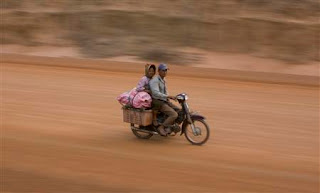




BEIJING - Thailand and Cambodia resolved tensions on Friday, putting recent clashes along their disputed border behind them and agreeing to breathe fresh life into long-standing efforts to settle the problem for good.
The leaders of the two Southeast Asian governments met on the sidelines of an Asia-Europe summit in Beijing.
"We are not just neighbors, we are very good friends indeed," Thai Foreign Minister Sompong Amornwiwat told reporters after the meeting between Thai Prime Minister Somchai Wongsawat and his Cambodian counterpart, Hun Sen.
"His Excellency Hun Sen said the incident that already happened is not the kind that both countries want. It happened instantly. That was uncontrollable at the time. But when things come to this point, the two sides have to advise our troops not to have confrontation any longer."
A Thai soldier died on Tuesday from wounds sustained in the latest flare-up on October 15 near the 900-year-old Preah Vihear temple, which is claimed by both countries. Three Cambodian soldiers were also killed.
The confrontation was the most serious border clash in years, although tensions have now eased.
Cambodian Foreign Minister Hor Namhong told reporters the two sides had agreed to use "existing mechanisms" to solve the border problem.
He pointed to talks this week between military commanders from the two countries to demonstrate progress, adding: "Already, we have had very good results over this question."
MILITARY MEETING
The senior military officials met in Siem Reap, site of Cambodia's Angkor temple, to discuss the fighting and other border issues. Customs and immigration officials from the two sides also attended.
In a statement on Friday after that meeting ended, the Thai military said it had achieved its objectives, namely "to develop a good understanding and relationship between the armed forces with a view to easing tension in the border areas."
It said the meeting had discussed how to deal with the narcotics trade, among other things.
Under the Thai constitution, any agreement reached by the government with another state needs parliamentary approval. The army statement said October 28 had been earmarked for parliament to debate border matters, a date mentioned by Sompong in Beijing.
Sompong also said the two countries had to work together to demine the border area.
Cambodia's foreign ministry urged Thailand to stick to existing deals on the border issue, including agreement on where certain parts of the frontier lie and a framework to demarcate the rest of border.
"Cambodia remains fully committed to not encroaching on any inch of Thai territory and would be very pleased if Thailand responded with the same commitment," it said in a statement sent to Thailand's foreign ministry and seen by Reporters on Friday.
The hilltop Preah Vihear temple has stirred nationalist passions in both countries for generations.
The International Court of Justice awarded it to Cambodia in 1962, a ruling that has rankled in Thailand ever since. It did not determine the ownership of 1.8 square miles (4.6 sq km) of scrub next to the Hindu ruins.


































